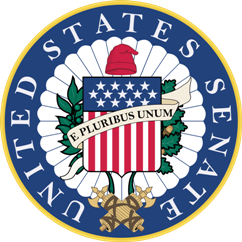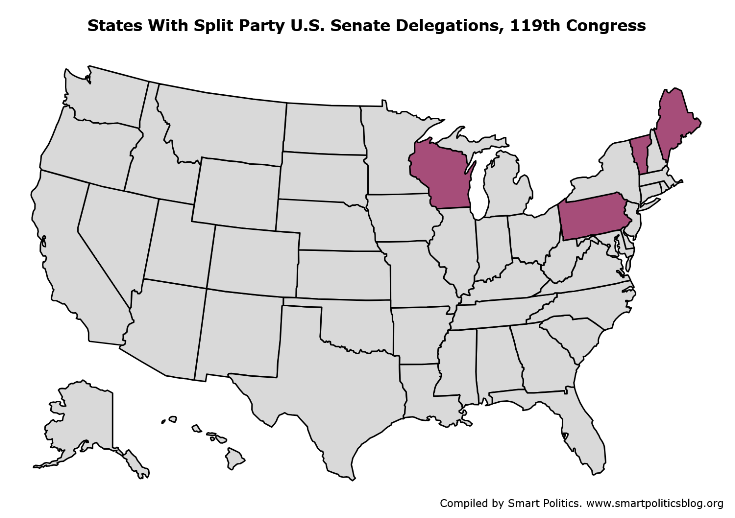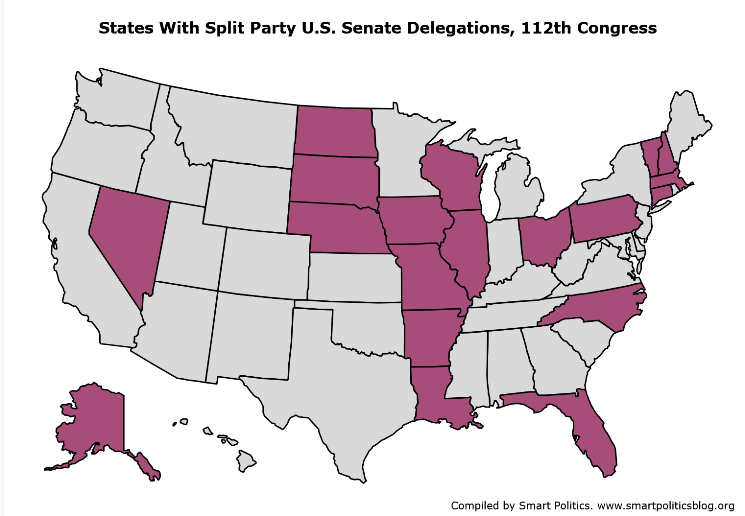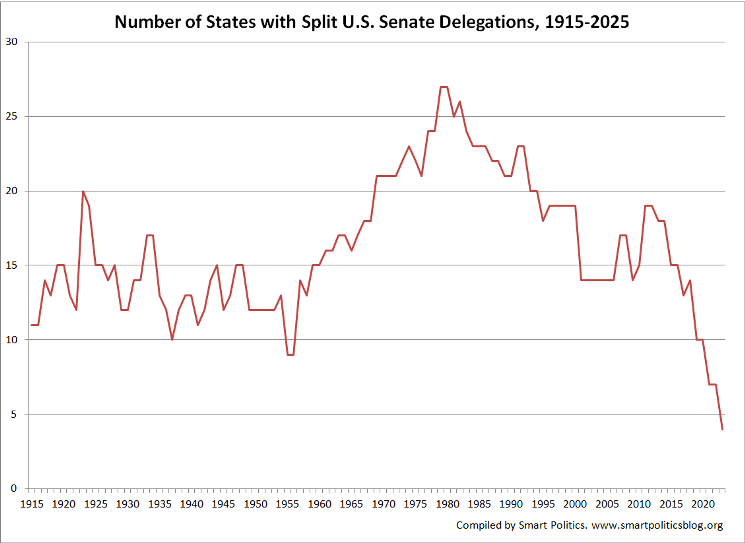119th Congress Smashes Record Low for Number of Split US Senate Delegations
The number of states with U.S. Senators affiliated with different political parties has dropped from 19 to four in just seven congresses

A frequent refrain heard in Washington, D.C. is that members on opposite sides of the aisle no longer talk to each other, and members are therefore less personally invested in striking deals with the other side as well as moderating their tone and ultimately their policy positions.
Compounding the problem is the trend of fewer and fewer states represented by more than one party in the nation’s upper legislative chamber – thus providing fewer opportunities for members to build bipartisan bridges even within a state delegation.
Once the 119th Congress is seated on January 3rd of next year, only four states will be represented by U.S. Senators who do not share the same party affiliation: Maine, Pennsylvania, Vermont, and Wisconsin.
That marks the lowest number of split delegation states in the history of the direct election era.
[It should be noted that one of these states – Vermont – still has a unified caucus with independent Bernie Sanders joining his fellow Democratic delegation member Peter Welch].
The 2024 cycle nearly sliced in half what was a previous record low in the chamber of seven states with split delegations heading into the November election.
Republican pick-ups in Ohio, Montana, and West Virginia created all-GOP delegations in those three states and a Democratic open seat win for independent Kyrsten Sinema’s seat created a homogeneous state delegation in Arizona.
Pennsylvania created the only newly minted split delegation after Republican Dave McCormick’s narrow victory over Democratic incumbent Bob Casey.
The decimation of split U.S. Senate delegations has been swift over the last decade and is now nearly complete.
The 112th Congress convened in 2011 with 19 split delegation states representing all four regions of the country: eight in the Midwest (Illinois, Iowa, Missouri, Nebraska, North Dakota, Ohio, South Dakota, Wisconsin), five in the Northeast (Connecticut, Massachusetts, New Hampshire, Pennsylvania, Vermont), four in the South (Arkansas, Florida, Louisiana, North Carolina), and two in the West (Alaska, Nevada).
That number slid to 18 states at the beginning of the 113th Congress, 15 states for the 114th, 13 states for the 115th, 10 states for the 116th, and seven states for the 117th and 118th Congresses.
Prior to the 117th Congress, only one convened with fewer than 10 split-delegation states during the direct election era – the 84th Congress following the Election of 1954. That cycle produced nine states with one Democratic and Republican U.S. Senator in Arizona, Delaware, Illinois, Massachusetts, Michigan, Minnesota, Nevada, New York, and Wyoming.
From the 64th through the 118th Congresses (1915-2025), there have been an average of 16.2 states with split U.S. Senate delegations, with a peak of 27 states during the 96th Congress following the Election of 1978.
There were at least 20 states in the chamber with split delegations uninterrupted for a quarter-century stretch from 1969 through 1994.
Looking ahead to 2026, the number of split delegations will not decline for at least one cycle – presuming there are no resignations or deaths. There are no U.S. Senate elections on the ballot in Pennsylvania, Vermont, and Wisconsin in two years and it is extremely unlikely that Republican Susan Collins will lose her seat to an independent in the state.
Follow Smart Politics on X/Twitter.




Julie Fedorchak is now the 1st woman ever elected to the house in ND leaving MS as the only state that has never sent a woman to the house.
States with single party congressional delegations and statewide constitutional offices are on the up too.
The WV gop control all statewide constitutional offices and both senate seats for the 1st time since 1931 and has an all gop congressional delegation for the 1st time since 1923. Furthermore all gop candidates swept every county.
MT has an all gop congressional delegation for the 1st time since 1911 and control all state levers for the 1st time since 1897.
In WA, democrats had a clean sweep statewide for the 1st time since 1936.
Democrats also held every seat both in New England and on the pacific coast.
Conversely, none of the governorships on the ballot changed party hands for the 1st time since 2011 and WI voted differently for pres. and senate for the 1st time since 1968.
Next cycle will very likely be the 1st time since 1948 without a Nixon (1952, 1956, 1960, 1968, 1972), Johnson (1960, 1964), Dole (1976, 1996), Bush (1980, 1984, 1988, 1992, 2000, 2004), Clinton (1992, 1996, 2016), Biden (2008, 2012, 2020) or Trump (2016, 2020, 2024) on the ballot
I think I’ve said enough. I’ll stop before I overload your brains.
The ’27-’28 cycle will likely not include a Harris (also), even though she fared better than Dole in both her vice presidential and presidential runs. IMO, she might have become a stronger contender for 2028 – or in the 2030s – had she passed on the ’16 Senate election (and not bid for the office in 2020, which came back to haunt her four years on) and been elected governor in ’18 instead.
Trump joins Stephen Grover Cleveland as the only (past or future) WH occupant with interrupted terms (22/24, and come next year 45/47). As well, “47” will join Cleveland, William Jennings Bryan, FDR, and “Dick” Nixon as those contenders who have garnered a sizable number of votes (both popular and EC) through at least three presidential general election campaigns.
Susan Margaret Collins:
– The only Republican Congress Member not only from the state but also from the entire (New England) region, for both 118th and
119th;
– The next election will be her first election before voters since the landmark Dobbs v Jackson decision (she has ‘survived’ her votes
in favor of Neil Gorsuch and Brett Kavanaugh for her 2020 bid, but those votes may yet become issues again);
– Only in 2014 has she not had to overcome a ‘drag’ at the top of the statewide ticket (a fellow Republican won for governor); since a
Republican will be in the WH in ’26 a Democrat seems likely to win the governor election, in line with its ‘naysayer’ tradition (2022
notwithstanding); can she successfully ‘swim upstream’ again, as she had in ’96, ’02, ’08, and ’20?
[…] 119th Congress Smashes Record Low for Number of Split US Senate Delegations […]
On late Tuesday (10th) the ‘ex- and incoming Bloke’ nominated “Ron Johnson” to an ambassadorship. Alas…
Mistaken identity aside, a would-be appointment would not result in a presumed change of the party of the occupant, since WI is one of a handful of states that bars the governor from filling a US senate vacancy. As well, since the incoming Congress will be comprised of a ‘whoppping’ 53 Republican senators…
I really appreciate how amazing you and your work are! Thank you for a job well done
[…] 38 states are in the midst of record major party winning streaks in presidential elections, how the 119th Congress set the record for the fewest split U.S. Senate delegations, and how the number of single party state congressional delegations reached a 70-year high in […]
[…] the demise of competitive, battleground states such as the 119th Congress setting a record for the lowest number of split U.S. Senate delegations, the number of single-party state congressional delegations reaching a 70+ year high, and the […]
[…] the rise of single party U.S. House delegations, the 119th Congress setting a record for the lowest number of split U.S. Senate delegations, and the number of single-party state congressional delegations reaching a 70+ year […]